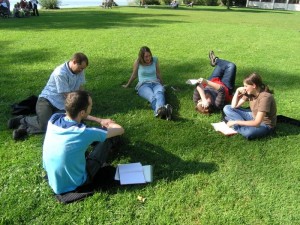Welcome to the Wakefield Doctrine (the theory of clarks, scotts and rogers)
Being Monday, we thought, ‘Lets pick a post at random* see what that gets us.
What that gets us is a pretty comprehensive explanation of the Doctrine, in general, and, while I didn’t take the time to actually read the post before copy-swiping it, rogers, in particular. What say I paste it and see what it is the god of random would have us read?
(New Reader alert. The primary value and biggest challenge for those of us who would use this here Doctrine here? To understand and appreciate how we relate ourselves to the world around us and to translate between our predominant worldview, (‘personality type’), and the ‘other two’, respectively. It’s the goal of the Wakefield Doctrine, as an additional perspective, to provide a tool for our understanding how the the people we encounter today are experiencing the world of our day.)
From July 29, 2014:
Welcome to the Wakefield Doctrine (the theory of clarks, scotts and rogers)
Seeing as, this Summer, we have not a few Readers who are quite conversant, (some even approaching fluent), in the Wakefield Doctrine, I thought I would try a series of posts that focused on real life situations.
New Readers? the Wakefield Doctrine is simply a perspective on life that offers (an) insight that is unique, useful and fun. The Wakefield Doctrine is not an ‘Answer’, rather it is a ‘what if’ question applied to …well, applied to everything! Learn to use this Wakefield Doctrine and you should never again hear yourself say, “My god! I don’t believe they just said that! I really thought I knew them better!” All that is required is a confident sense of curiosity and a healthy imagination. Everything else will follow, provided you are able to accept that:
- there are three worldviews (personal realities) that everyone lives their lives in, regardless of age, gender, culture or patience
- these three are: the world of the Outsider(clarks), the reality of the Predator(scotts) and the life of the Herd Member(rogers)
- we are all born with the potential to live in one of these three, which we do by age 5 or so, however, we never lose the capacity to see the world as do ‘the other two’
- through reading the Posts and the Pages (of this blog), you learn the characteristics associated with each of the three personality types sufficiently to recognize them in the people around you
- by observing the behavior of the people in your life you will be able to infer how they ‘relate themselves to the world around them’
that’s all you need to get started. (Tip: when trying to decide which of the three personality types a person is, immediately throw out the ‘yeah, no frickin way‘ worldview, that will leave you with only two to compare and contrast.) Read the Posts and, especially, the Comments, as these are from people like yourself who stumbled across this blog and didn’t have the good sense to keep moving on. (Encouragement: If you are still reading this, your chances of ‘getting’ the Wakefield Doctrine have risen from 0 to 47%. and…and! if you read three more Posts and come back here and still find the Doctrine intriguing, then we want to hear from you, so write us a Comment. Your initial impressions are important to us, they would be appreciated.)
Case Study #1
rogers.
(with) rogers, we can often see what, for the partial purpose of being confusing, is a certain… quality that we call their Expression.* (This) Expression is the objective edifice of a roger’s personality, it is their ‘purpose’ to/within the Herd. Often it manifests as (an) occupation or profession, (scientist, accountant, prosecuting attorney or judge). It can also be an avocation or hobby (i.e. cabinet making, stamp collecting, genealogy or ship-in-bottle builder). It, (this Expression), can even be something as fundamental as: keeping house, maintaining a family life or staying in touch with relatives (near or far). a roger, as a Rule (ha, ha), does not consciously set out to find and develop an Expression. (This is not to say that there is not a predisposition to a certain type of activity that becomes their Expression, it’s just that they are not thinking, “Now… what do I want for my Expression”). Having said that, there are certain values, qualities, characteristics necessary in this Expression. For example, a roger’s Expression must be perceived both as a value to others (in the Herd) and a manifestation of the virtue of disciplined effort (on the part of an individual). One way of confirming (a roger’s) Expression is the ‘everyone knows’ test. ‘Walter is such a talented woodworker, everyone knows how good he is’ or ‘Martha is so focused on family, anyone who meets her senses that right away’
In Case Study#1 we have a roger with an Expression of musical talent, technical musical skills, music. This means, very simply, that had you the capability of visiting this roger at any time throughout his life, you would have seen a guitar somewhere in the scene. The circumstances (and the guitar) might be different at various times, but it would always be there.
I need to introduce another concept at this point: context.
‘Context’ is (a) reason, (it is) the need, the opportunity that roger would have in his life, (at any given point in time), to manifest his Expression. This/these contexts might consist of being a member of a band, or having a recital as part of a class in a community college, it might simply be helping a friend, (filling in for an absent musician). The key to these contexts is that there is a need, for roger to play. And, this need, is from those around him, not simply a subjective demand to play, (which, in turn, is a different aspect of the Expression) . ( If you are now thinking, ‘ …you’re talking about the Herd, right? the people around him who are identified as Herd Members?’ very astute! good!)…what happens when there cease to be contexts?
(to be cont’d)
(hey, I wrote most of the above yesterday. When I got up this morning, I thought… ‘jeeze! clark you better spice that Post up! Everbody be snoozing by paragraph 2!! ‘cept for zoe and that’s only cause she a professional…. any good teacher or presenter…. or speaker-in-front-of-more-than-one-person-er knows that!!
so here are three jokes, please insert them in the place of your choice in today’s post
- Julius Caesar walks into a bar. “I’ll have a martinus,” he says. The Bartender gives him a puzzled look and asks, “Don’t you mean a ‘martini’?” ” Look,” Caesar retorts, “If I wanted a double, I’d have asked for it!”
- So Jesus walks into a bar and says, “I’ll just have a glass of water.”
- A blonde(clark), a brunette(roger) and a redhead(scott) were stuck on an island for many, many years until one day they found a magic lamp.
They rubbed it hard and out popped a genie. He said that he could only give three wishes so since there were three girls, each would get one wish. The redheaded scottian female went first. “I hate it here. It is too hot and boring. I want to go home!” “Okay,” replied the genie. And off she went. Then the brunette rogerian woman went. “I miss my family, my friends and relatives. I want to go home, too!!” And off she went. The blonde clark started crying and said, “I wish my friends were back here!”* to be confused with a ‘rogerian expression’, which is a form of rhetorical aggressiveness (usually spoken, but possible as the written word) that is characteristic of this worldview.
* the ‘random’ comes from scrolling through all posts without looking and clicking, ‘Stop, enough already’.



 About clarkscottroger
About clarkscottroger
Educational and entertaining! And I liked the jokes.
Oh, how easy to forget the importance of vocabulary – “world” of a clark, “reality of a scott and the life of rogers.
yeah, vocabulary and maps, the only part of the world around us we can manipulate
Last i checked, some of us use those words to manipulate each other pretty well, too.
And therein lies the beauty of ‘the Everything Rule’. That everyone, regardless of personality types are prone to doing certain things, it is how that (thing) manifests in their personal reality that is the difference. Appreciating this difference (and given that we all have the potential of ‘the other two’) is what helps us become better us(s)*
*not a ‘real’ pronoun